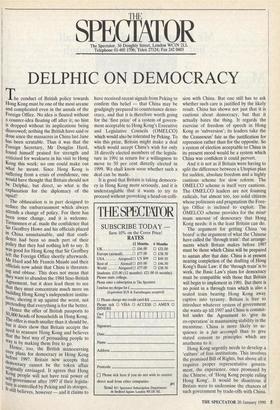THE
SPECTATOR
The Spectator, 56 Doughty Street, London WC1N 2LL Telephone 01-405 1706; Telex 27124; Fax 242 0603
DELPHIC ON DEMOCRACY
he conduct of British policy towards
T
Hong Kong must be one of the most arcane and complicated even in the annals of the Foreign Office. No idea is floated without a counter-idea floating off after it; no hint is dropped without its implications being disavowed; nothing the British have said or done since the massacres in China last June has been scrutable. Thus it was that the Foreign Secretary, Mr Douglas Hurd, found himself praised for strength and criticised for weakness in his visit to Hong Kong this week: no one could make out what he meant. Since Hong Kong is suffering from a crisis of confidence, one would have thought that Britain should not be Delphic, but direct, so what is the explanation for the diplomacy of the squid?
The obfuscation is in part designed to reduce the embarrassment which always attends a change of policy. For there has been some change, and it is welcome. Tienanmen et al. made the confidence that Sir Geoffrey Howe and his officials placed in China unsustainable, and that confi- dence had been so much part of their Policy that they had nothing left to say. It was good for Hong Koshortly Sir Geoffrey left the Foreign Office afterwards. Mr Hurd and Mr Francis Maude and their officials now admit that China is threaten- ing and obtuse. This does not mean that they want to abandon the 1984 Sino-British Agreement, but it does lead them to see that they must concentrate much more on building Hong Kong's independent institu- tions, shoring it up against the worst, not Pretending that everything is for the better. Hence the offer of British passports to S0,000 heads of households in Hong Kong. T. he offer is much smaller than it should be, blIt it does show that Britain accepts the need to reassure Hong Kong and believes that the best way of persuading people to stay is by making them free to go. Hence, too, the British manoeuvring over plans for democracy in Hong Kong before 1997. Britain now accepts that democracy cannot be the token affair originally envisaged. It agrees that Hong Ong people will not have real power of !'elf-government after 1997 if their legisla- Lurets controlled by Peking and its stooges. It still believes, however — and it claims to
have received recent signals from Peking to confirm this belief — that China may be grudgingly prepared to countenance demo- cracy, and that it is therefore worth going for the 'first prize' of a system of govern- ment acceptable to Hong Kong's Executive and Legislative Councils (OMELCO) which would also be tolerated by Peking. To win this prize, Britain might make a deal which would accept China's wish for only 18 directly elected members of the legisla- ture in 1991 in return for a willingness to move to 50 per cent directly elected in 1999. We shall know soon whether such a deal can be made.
It is good that Britain is taking democra- cy in Hong Kong more seriously, and it is understandable that it wants to try to proceed without provoking a head-on colli-
sion with China. But one still has to ask whether such care is justified by the likely result. China has shown not just that it is cautious about democracy, but that it actually hates the thing, It regards the exercise of freedom of speech in Hong Kong as `subversion'; its leaders take the the Ceausescus' fate as the justification for repression rather than for the opposite. So a system of election acceptable to China in its present mood would be a system which China was confident it could pervert.
And it is not as if Britain were having to split the difference between a Utopian plan for sudden, absolute freedom and a highly cautious scheme for slow reform. The OMELCO scheme is itself very cautious. The OMELCO leaders are not foaming radicals, but almost too, too solid citizens whose politeness and pragmatism the Fore- ign Office is inclined to exploit. The OMELCO scheme provides for the mini= mum amount of democracy that Hong Kong needs: it is the least Britain can do.
The argument for getting China 'on board' is the argument of what the Chinese have called the 'through train': that arrange- ments which Britain makes before 1997 must be those which China will be prepared to sustain after that date. China is at present nearing completion of the drafting of Hong Kong's Basic Law: if the 'through train' is to work, the Basic Law's plans for democracy must be compatible with those that Britain will begin to implement in 1991. But there is no point in a through train which is also a sealed train bearing Hong Kong away captive into tyranny. Britain is free to introduce whatever system of government she wants up till 1997 and China is commit- ted under the Agreement to 'give its co-operation' in maintaining stability in the meantime. China is more likely to ac- quiesce in a fait accompli than to give stated consent to principles which are anathema to it.
Hong Kong urgently needs to develop a 'culture' of free institutions. This involves the promised Bill of Rights, but above all it requires proper representative govern- ment, the experience, once promised by the Chinese, of `Hong Kong people ruling Hong Kong'. It would be disastrous if Britain were to undermine the chances of such government by trade-offs with China.


















































 Previous page
Previous page